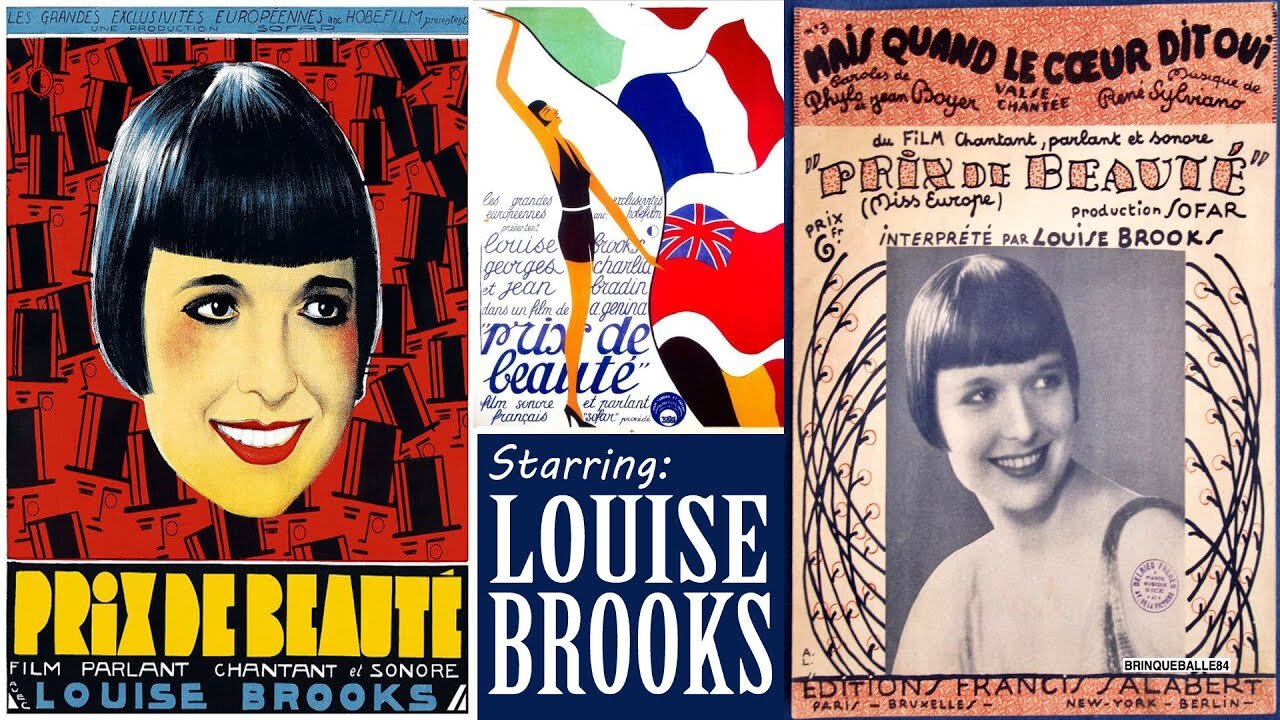Premium Only Content

Wichita's Louise Brooks in "Beauty Prize" (1930)
Starring Wichita's, Louise Brooks
Beauty Prize (Prix de Beauté) is a 1930 French production directed by Augusto Genina. The film is notable for being the first sound film made by star Louise Brooks, although all of her dialogue and singing were dubbed.
Cast:
Louise Brooks as Lucienne Garnier
Georges Charlia as Andre
Augusto Bandini as Antonin, Lucienne and Andre's friend and co-worker
Andre Nicolle as Le secretaire du journal, to whom Lucienne appeals to try to withdraw from the contest
Marc Ziboulsky as Le manager
Yves Glad as Le maharajah
Alex Bernard as Le photographe, who takes a picture of Lucienne and Andre before her fame
Gaston Jacquet as Le Duc
Jean Bradin as Prince de Grabovsky
Plot line:
Lucienne, typist and gorgeous bathing beauty, decides to enter the 'Miss Europe' pageant sponsored by the French newspaper she works for. She finds her jealous lover Andre violently disapproves of such events and tries to withdraw, but it's too late; she's even then being named Miss France. The night Andre planned to propose to her, she's being whisked off to the Miss Europe finals in Spain, where admirers swarm around her.
“Owing to bad synchronization this talker is a failure. After five days it had to be removed. The Titania Palast has at no times made such a bad business with a film as with this one.”1 Featuring an international cast and crew that included the 23-year-old American actress Louise Brooks in her last major role, it was shot silent in Paris with an observant and fluid camera. Based on an original idea by G.W. Pabst and René Clair (who was originally slated to direct), it became, as happened in the late silent era, a hybrid of silent and sound, with dialogue scenes and other sound effects added to keep up with the novelty of talkies.
Variety’s reviewer all but suggested that Prix would have been better off leaving sound out: “Direction of Augusto Gennina [sic] is on a much higher level than that of most other directors. It shows the right conception for facts, a natural way of looking at things and reality.”
The film’s fate greatly improved after the silent version was recovered at Cineteca di Milano in 1998, and it joined the ranks of other great late silents, those movies that make you wish sound hadn’t taken over so thoroughly – Lonesome (Paul Fejos, 1928), Harbor Drift (Leo Mittler, 1929), The Wonderful Lies of Nina Petrovna (Hanns Schwarz, 1929) and People on Sunday (Robert Siodmak & Edgar G. Ulmer, 1930) among them.
The visuals are their own marvel, shot by Rudolph Maté, who had just finished photography for The Passion of Joan of Arc (Carl Theodor Dreyer, 1928), with its intense close-ups and impossibly low angles shot from deep trenches dug in the ground. The newsreel-style beginning of Prix de beauté takes advantage of a silent camera to capture Paris at a particularly exciting moment, enlivened by the Jazz Age but not yet completely overrun by mechanisation (pedestrians could still outswarm cars on the streets).
Production insight:
The original drafts of the screenplay was written by René Clair; however, because of a dispute between Clair and La Société des Films Artistiques (SOFAR), the script was given to the Italian director Augusto Genina.
Prix de beauté was shot in and around Paris between August 29 and September 27, 1929, including at the Studios Joinville, Joinville-le-pont, Val-de-Marne.
The scenes of the Miss Europe beauty pageant (an actual event held in San Sebastian, Spain) were filmed in Paris at the Jardin d’ Acclimatation, where thousands of spectators had gathered.
---
This video is for educational, historical, and informational purposes only and has not been monetized in any manner whatsoever.
It has been posted to be ad-free.
In Title 17 U.S.C. section 106A-117 of the US Copyright Law and under section 107 of the Copyright Act of 1976, allowance is made for "fair use" for purposes such as criticism, comment, news reporting, teaching, historic preservation, scholarships, education and research.
Fair use is a use permitted by copyright statute that might otherwise be infringing.
-
![Mr & Mrs X - [DS] Created Antifa To Push An Insurgency In This Country - Ep 8](https://1a-1791.com/video/fww1/f9/s8/1/k/f/O/j/kfOjz.0kob-small-Mr-and-Mrs-X-DS-Created-Ant.jpg) LIVE
LIVE
X22 Report
53 minutes agoMr & Mrs X - [DS] Created Antifa To Push An Insurgency In This Country - Ep 8
1,396 watching -
 LIVE
LIVE
Wendy Bell Radio
4 hours agoPet Talk With The Pet Doc
398 watching -
 1:19:30
1:19:30
Game On!
22 hours ago $3.54 earnedCollege Football Week 4 Betting Preview!
65.9K2 -
 26:04
26:04
Artur Stone Garage
4 days ago$500 Civic: Will It EVER Drive Without Breaking Down?
16 -
 31:44
31:44
SouthernbelleReacts
2 days ago“E.T. Phone Home! 🛸 Emotional Mom Style Reaction to E.T. the Extra-Terrestrial (1982)”
681 -
 20:10
20:10
JohnXSantos
21 hours agoI Built a FAKE Luxury Brand With $100 In 7 Days
4 -
 25:24
25:24
marcushouse
1 hour agoStarship Test Trouble… and Block 3 Finally Unveiled! 🤯
101 -
 1:13:26
1:13:26
Squaring The Circle, A Randall Carlson Podcast
8 hours agoSaving The Bees and Healing The Planet!
5321 -
 16:18
16:18
Chris Harden
2 days agoCharlie Kirk Utah Reaction | What Locals Are Saying
191 -
 50:47
50:47
ChurchandState1776
18 hours agoFree speech is not negotiable with Sam Anthony
552